-
Ever wanted an RSS feed of all your favorite gaming news sites? Go check out our new Gaming Headlines feed! Read more about it here.
-
We have made minor adjustments to how the search bar works on ResetEra. You can read about the changes here.
Climate Change Fight |OT|
- Thread starter Pomerlaw
- Start date
You are using an out of date browser. It may not display this or other websites correctly.
You should upgrade or use an alternative browser.
You should upgrade or use an alternative browser.
- Status
- Not open for further replies.
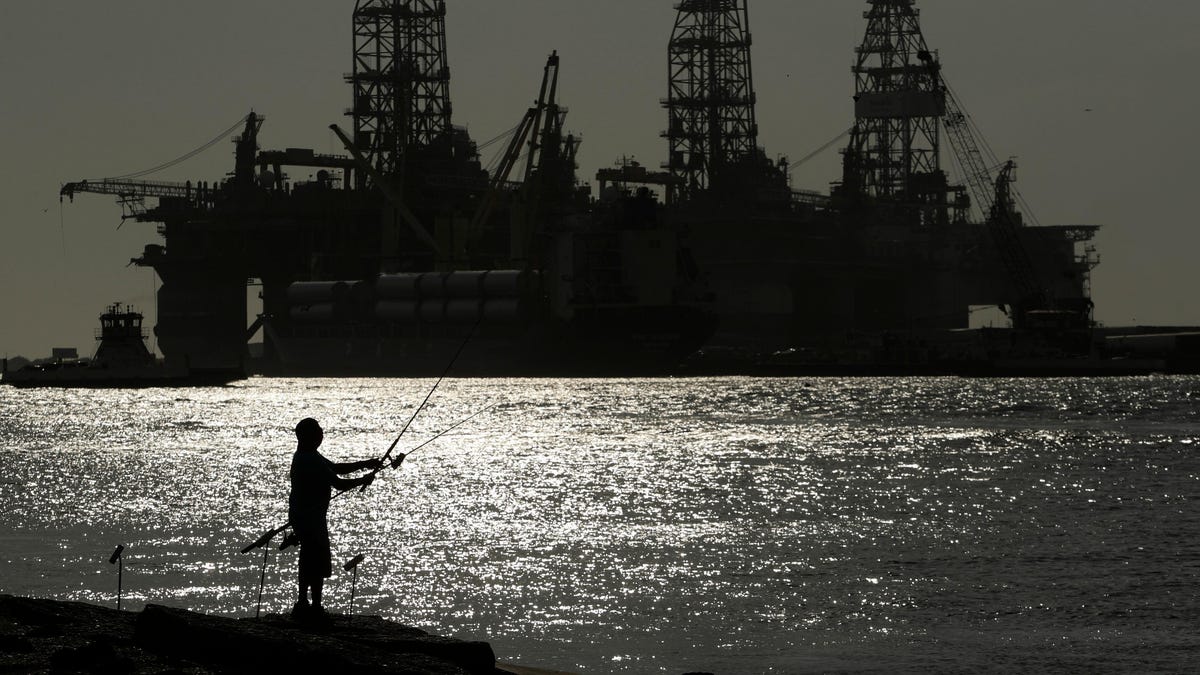
Biden Cancels Offshore Drilling in Alaska and Gulf of Mexico
The administration won't move forward with the three leases in the Cook Inlet and the Gulf because of "lack of industry interest" and legal difficulties.
 gizmodo.com
gizmodo.com
In a rare nugget of climate-related good news, the U.S. Department of the Interior announced Wednesday that it is canceling three offshore oil and gas drilling lease sales: one in Alaska's Cook Inlet and the other two in the Gulf of Mexico.
The move means millions of acres of coastal waters will no longer be sold and subject to fossil fuel extraction. And, more broadly, it also means the U.S. won't be holding any offshore lease sales at all this year, as those were the only ones on the docket.
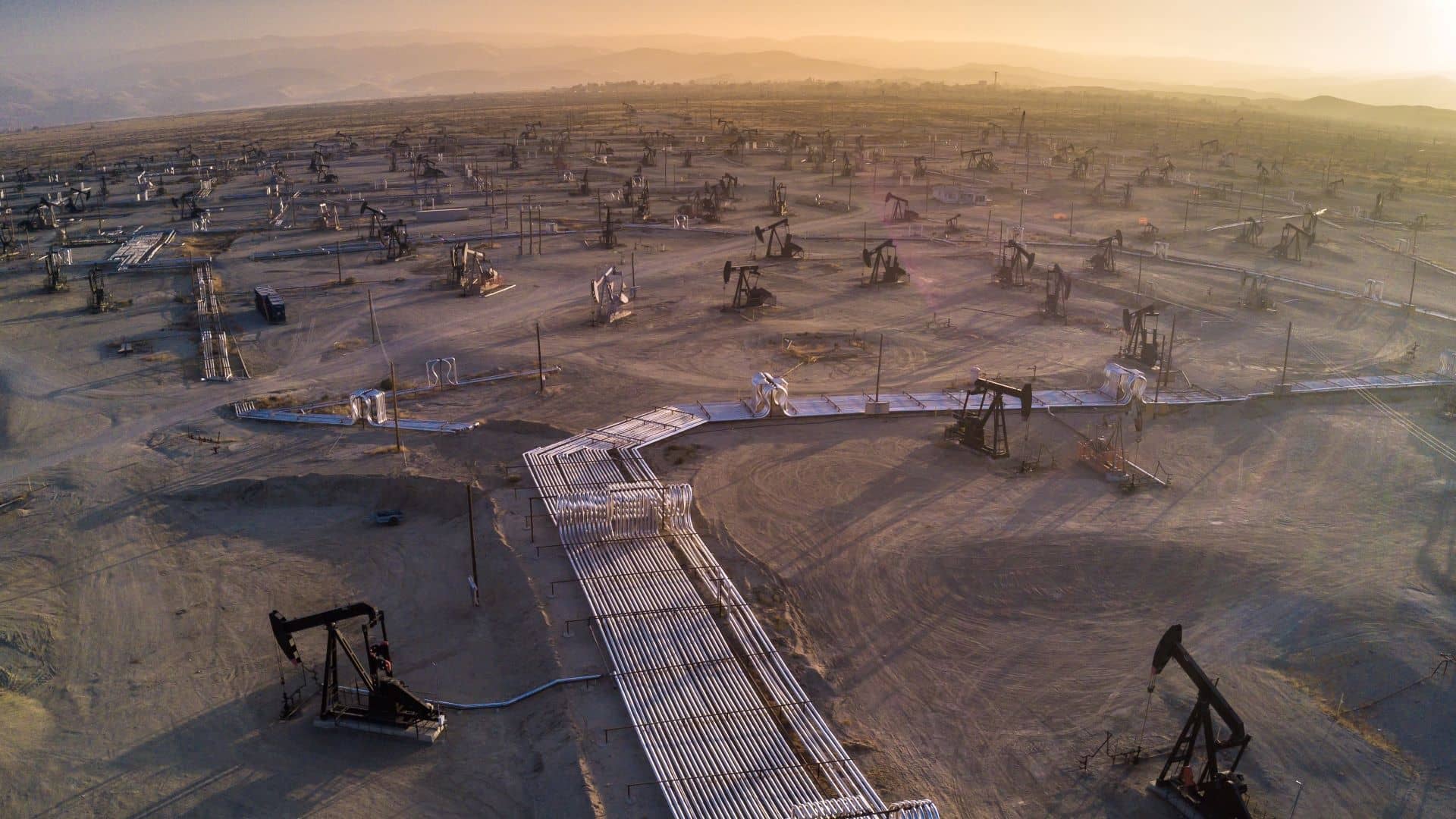
Oil and Gas M&A is Undermining the Energy Transition. It’s time to act.
Oil and gas companies sell assets for a variety of business reasons, many of which are unrelated to net zero strategy. Regardless of the motivation, asset transfers can have significant climate consequences depending on the characteristics of buyers and sellers.
Publicly traded companies have begun to set climate targets, but to transform their businesses to meet these goals, have sold assets to operators that often lack comparable climate goals.
Oil and gas companies sell assets for a variety of reasons, whether to raise money for energy transition planning, move emissions off their books, or meet traditional objectives like repaying debt or increasing dividends. Regardless of the motivation, asset transfers can have significant climate consequences depending on the characteristics of buyers and sellers.
One example: in January 2021 Shell, TotalEnergies, and Eni – three majors with industry-leading climate standards – transferred the Umuechem oil field in the Niger Delta to Trans-Niger Oil and Gas, a private-equity-backed operator with no climate commitments. Following the transfer, flaring, a significant source of methane emissions, rose dramatically, with average weekly flaring more than quadrupling. The surge in post-deal flaring emissions illustrates how handing the keys to a less responsible operator can trigger significant climate consequences.

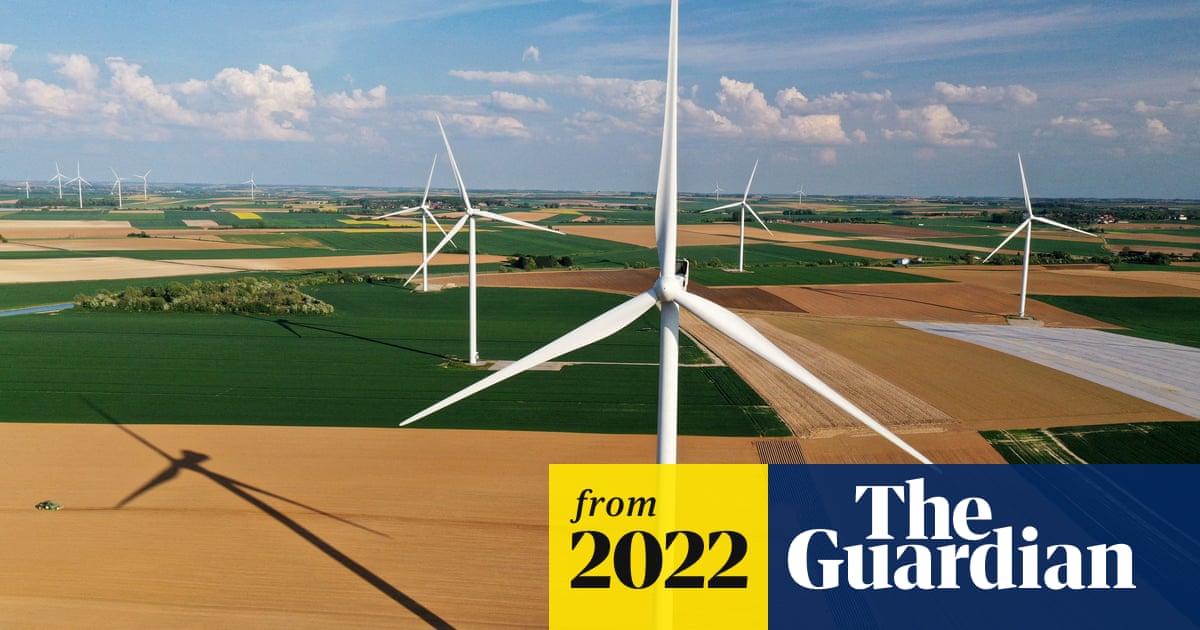
EU plans ‘massive’ increase in green energy to help end reliance on Russia
European Commission says extra €210bn needed over next five years to pay for phasing out of Russian fossil fuels
The EU plans a "massive" increase in solar and wind power, and a short-term boost for coal, to end its reliance on Russian oil and gas as fast as possible.
In a plan outlined on Wednesday, the European Commission said the EU needed to find an extra €210bn (£178bn) over the next five years to pay for phasing out Russian fossil fuels and speeding up the switch to green energy. Senior officials conceded that in the short term, the race to get off Russian gas would mean burning more coal and nuclear energy.
The plan, drawn up in response to the Kremlin-ordered invasion of Ukraine and subsequent soul searching about Europe's dependence on Russian gas, proposes upgrades to the EU green deal, the bloc's flagship policy to confront the climate crisis.
The Commission proposed that 45% of the EU's energy mix should come from renewables by 2030, an advance on the current 40% target suggested less than a year ago. Officials also want to cut energy consumption by 13% by 2030 (compared to 2020), in comparison with the current proposal of a 9% saving.
But phasing out Russian gas means coal-fired power plants "might also be used longer than initially expected", states the EU strategy. The decision to quit Russian gas has also led to a scramble to increase Europe's imports of liquified natural gas from countries such as the US and Qatar, as well as pipeline gas from Azerbaijan.

Trees aren’t a climate change cure-all – 2 new studies on the life and death of trees in a warming world show why
More carbon dioxide in the air doesn’t necessarily mean more growth for trees, and the increasing risk of wildfires and drought has major consequences, as an interactive map shows.
 theconversation.com
theconversation.com
When people talk about ways to slow climate change, they often mention trees, and for good reason. Forests take up a large amount of the planet-warming carbon dioxide that people put into the atmosphere when they burn fossil fuels. But will trees keep up that pace as global temperatures rise? With companies increasingly investing in forests as offsets, saying it cancels out their continuing greenhouse gas emissions, that's a multibillion-dollar question.
The results of two studies published in the journals Science and Ecology Letters on May 12, 2022 – one focused on growth, the other on death – raise new questions about how much the world can rely on forests to store increasing amounts of carbon in a warming future. Ecologist William Anderegg, who was involved in both studies, explains why.
Together these studies suggest that the benefits carbon dioxide has for growth won't be nearly as large as people thought, and the risk of climate stress, particularly wildfire, drought and insects, will be much larger than people anticipate.
So far, carbon offset protocols and markets have not really grappled with this updated scientific understanding of the risks that forests face from climate change. This tells us that climate policymakers and offset developers need to be very careful about how they count on forest offsets to deliver benefits.
The more hopeful message is that our actions in the next decade matter enormously. If we can rein in the speed of climate change and take a lower-emissions path, that does a huge amount to lower risk and increase the benefits. This isn't a "throw up our hands and panic" situation – it is our chance to take steps that make sure resilient and sustainable forests last for the future.

The Annihilation of Florida: An Overlooked National Tragedy ❧ Current Affairs
<p>An accelerating race to destroy Florida’s wilderness shows what we value and previews our collective future during the climate crisis.</p>
Pomerlaw I don't think this thread is really serving the purpose you may have intended it to be from the start; it's largely turned into a place to post depressing climate news
*gestures at the last several posts*
Hi Articalys
I started this thread to avoid the doomposting that ends up happening in all other climate change threads on ERA. We still have some negative news in this thread but overall it's not as bad, afterall not everything is going well...
This seems doable and would help tremendously.
I already replaced a lot of red meat I consume with protein or veggie meals. There are more and more options to replace meat or mix with meat, so If you don't want to cut it completely, then you can at least reduce the amount you eat.
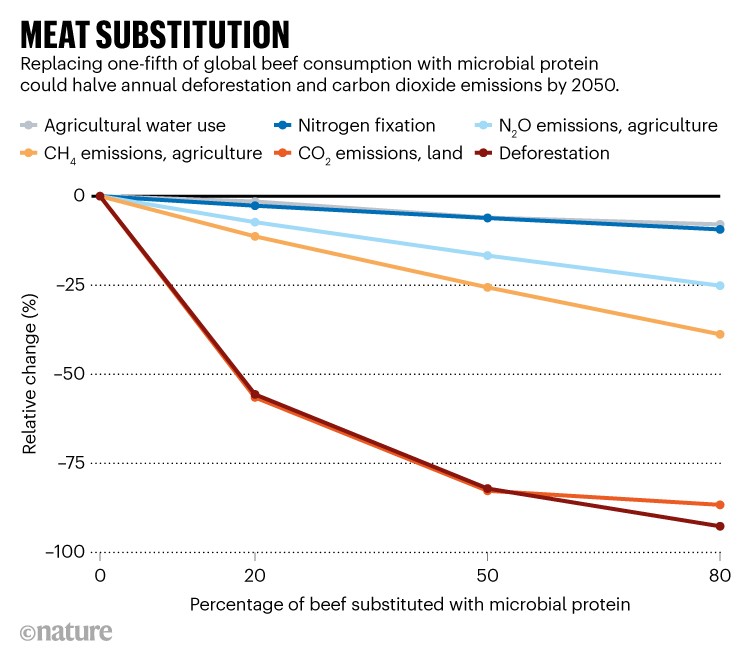
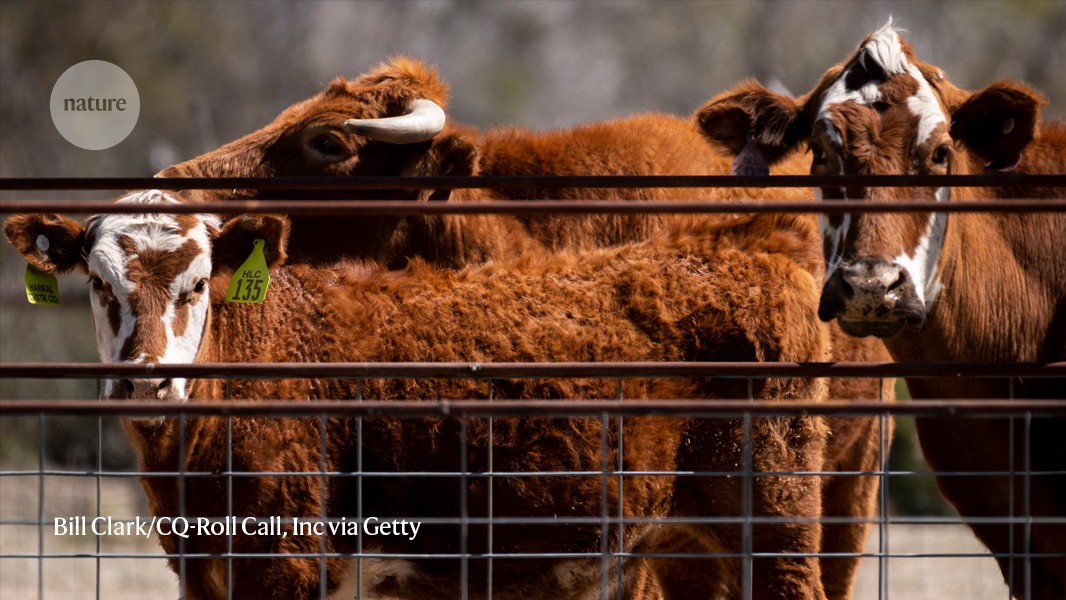
 www.nature.com
www.nature.com
I already replaced a lot of red meat I consume with protein or veggie meals. There are more and more options to replace meat or mix with meat, so If you don't want to cut it completely, then you can at least reduce the amount you eat.
Replacing just 20% of global beef consumption with a meat substitute within the next 30 years could halve deforestation and the carbon emissions associated with it, finds a modelling study.


Eating one-fifth less beef could halve deforestation
Model suggests that switching to microbial ‘meat’ can cut carbon emissions.
Did I ever give any indication I was saying to or to not post anything in particular? Don't try and put words in my mouth, I was just commenting on the trending direction of the posts here (which lines up with how news is going in the real world) and that this is generally turning into more of a climate change discussion thread rather than specifically somewhere to post "good news only", which is fine.Just say "this thread isn't for negative news, please stop posting that" instead of corny *gestures above!* It's not offensive don't worry
I'm fatalistic and agree that we're all screwed anyway, so I don't really care what you're posting. Mostly just wanted to let the OP know if they wanted to offer any counterarguments.
I'm fatalistic and agree that we're all screwed anyway, so I don't really care what you're posting. Mostly just wanted to let the OP know if they wanted to offer any counterarguments.
You are wasting my time.
I think I sounded overly aggressive. I think Articalys has a point and I've largely just been spamming the thread with negative news for however long at this point. I think the thread was started from a point of activism, so it should just be that. Even if news spam is fine, it should be activism related and not just the negative news of the hour.
For the Americans:

 www.environmentalvoter.org
www.environmentalvoter.org

 www.environmentalvoter.org
www.environmentalvoter.org
For the Americans:

Environmental Voter Project
We identify inactive environmentalists and transform them into consistent voters to build the power of the environmental movement.

Get Involved
We respect your time as a volunteer. Every action you take with EVP is backed by research, and we regularly brief you on the impact of your efforts.
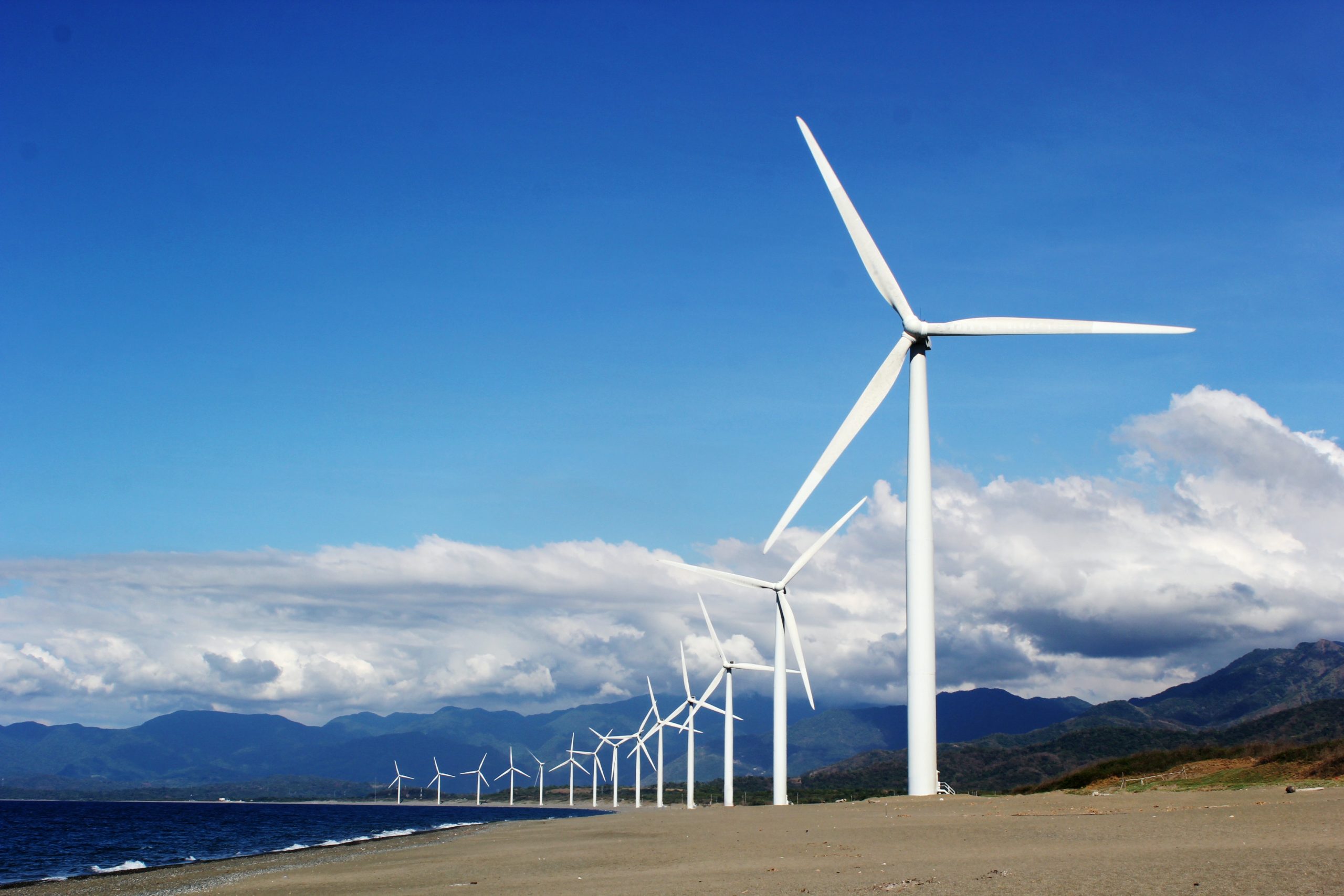
California breaks record by achieving 100% renewable energy for the first time - Earth Day
As Earth Month drew to a close, the state of California was recently able to produce virtually all of their energy needs from renewable sources for the first time.
In early April, the state achieved a new record at 97.6% renewable power, and on May 2 they were able to reach 99.9%. On May 8 the record was broken yet again, with 103% of the state's power needs being met by renewables for a few hours.
This seems doable and would help tremendously.
I already replaced a lot of red meat I consume with protein or veggie meals. There are more and more options to replace meat or mix with meat, so If you don't want to cut it completely, then you can at least reduce the amount you eat.

Eating one-fifth less beef could halve deforestation
Model suggests that switching to microbial ‘meat’ can cut carbon emissions.www.nature.com
Same here. While I find it hard to let go of meat, so far I've taken beef out of my daily intake. I only reserve it for eating out.
Fantastic news! What's important is that we continue sharing the positive news.
The goal isn't to deny the shit happening right now, but instead not dwell on it 100% of the time. We can do this by sharing and reposting good stuff like this.
🤝Fantastic news! What's important is that we continue sharing the positive news.
The goal isn't to deny the shit happening right now, but instead not dwell on it 100% of the time. We can do this by sharing and reposting good stuff like this.
Plastic waste across Australia's beaches and coastlines has declined by a third over the past six years as a result of a wide range of local initiatives to reduce litter, according to research by Australia's science agency.
China has reduced air pollution nearly as much in seven years as the US did in three decades, helping to bring down average global smog levels in the process. The amount of harmful particulates in the air in China fell 40% from 2013 to 2020, according to the University of Chicago's Energy Policy Institute, which would add about two years to average life expectancy if sustained.
Last year, local governments across the U.S. announced a combined 207 megawatts of energy from 21 landfill solar projects, according to recent figures from the World Resources Institute and RMI, an organization that advances clean energy projects. That's a 10-fold increase in energy capacity compared with recent years, and it includes the three largest projects in the country to date.
I don't have any big news to share, but we just got an electric mower today and I'm kind of in love with it.
Out of curiosity, which one did you get? We moved away from a gas mower a few years back but the manual mowers aren't all that great.I don't have any big news to share, but we just got an electric mower today and I'm kind of in love with it.
It's the HART 40-Volt Cordless 18-inch Push MowerOut of curiosity, which one did you get? We moved away from a gas mower a few years back but the manual mowers aren't all that great.

Got it for $218 plus tax at Wal-Mart. Used it for my front lawn today, and I'm impressed with it so far.
Nice. How long have Electric Lawnmowers been a thing?
With other appliances such as vacuums, you'd assume it would've existed for a while.
With other appliances such as vacuums, you'd assume it would've existed for a while.
First time you switch it on and go "wait is this fuckin thing even on-oh!" is pretty magical, isn't it?I don't have any big news to share, but we just got an electric mower today and I'm kind of in love with it.
My dad has had one for 3 decades or so... so they aren't exactly new...Nice. How long have Electric Lawnmowers been a thing?
With other appliances such as vacuums, you'd assume it would've existed for a while.
Nice. How long have Electric Lawnmowers been a thing?
With other appliances such as vacuums, you'd assume it would've existed for a while.
I guess Don means one with internal batteries lol. Not sure how long those have been around but they seem to be pretty popular now. My family has only ever owned 'electric' ones but I assume like FiiX means, they are plug-in ones.My dad has had one for 3 decades or so... so they aren't exactly new...
I don't have any big news to share, but we just got an electric mower today and I'm kind of in love with it.
Good job!
All the appliances I use outside are electric, but not my mower... I thought about it and it's probably better to keep my old one for now since it doesn't use a lot of gas and is still working fine... I don't cut my lawn very often.
Don't forget to keep a part of it uncut for flowers and insects :)
Yeah, its usually best to wait until your gas appliance/vehicle breaks down before going out and buying electric.
In other good news:
China to ban new heavy industrial projects in key zones
China showing how economic policy is done.
Would be even better if they fined(for billions) or kicked out any foreign businesses who rely on oil and coal too much.
It still doesn't dismiss their nationalism and other foreign policy bullshit.
China to ban new heavy industrial projects in key zones
China showing how economic policy is done.
Would be even better if they fined(for billions) or kicked out any foreign businesses who rely on oil and coal too much.
It still doesn't dismiss their nationalism and other foreign policy bullshit.
I don't have any big news to share, but we just got an electric mower today and I'm kind of in love with it.
One of the best things I've ever done. Even ignoring the environmental and financial benefits they're just so much better to use than the old petrol ones, fucking hell I hated those things.
I don't think geoengineering is generally a great long term solution, but for some actual answers:
Controversial Spewed Iron Experiment Succeeds as Carbon Sink
Dumping iron into the ocean stimulates blooms of diatoms that pull down carbon dioxide in the atmosphere--but only under the right conditions
But such fallen carbon only resides in the deep for a few centuries at best. Eventually, it makes its way back to the surface as the ocean's bottom water circulates and rises anew near the equator (although carbon buried in sediment might stay buried longer). And such techniques might be capable, at best, of sequestering one billion metric tons of carbon dioxide per year (based on the extent of iron-deficient waters around the globe), compared with annual human emissions of more than eight billion metric tons and rising. "There is massive uncertainty in this figure, and until much more research is done no serious scientist should express any confidence in such estimates," of iron fertilization's geoengineering potential, cautions oceanographer Richard Lampitt of the National Oceanography Center in England, who also argues that more research into such potential geoengineering techniques is needed due to the failure of global efforts to curb greenhouse gas emissions.
In fact, these iron-seeding experiments could backfire by producing toxic algal blooms or oxygen-depleted "dead zones," such as the one created in the over-fertilized waters at the mouth of the Mississippi River. At present, scientists have no way to ensure that the desired species of silica-shelled diatoms bloom. In short, Smetacek says, the type of bloom—and therefore the ability to sequester CO2—"cannot be controlled at this stage."
There have studies on this in the past (e.g. 1, 2, 3) and one of the main issues seem to be that the co2 remains high enough in the water table that it doesn't really matter. From the above article:
By the middle of the third week after the researchers stopped adding iron, the bloom began to die. So many diatoms died, in fact, that they overwhelmed any natural systems for decay and fell in large numbers below 500 meters in depth. At least half of the total bloom biomass sank below 3,000 meters, according to the scientists' calculations.
The combination of areas that this would actually work in (i.e. low iron areas of the ocean) that are also sufficiently deep might not end up being that effective.
In the context of iron fertilisation as a geoengineering tool for atmospheric CO2 removal, SAGE has clearly demonstrated that a significant proportion of the low iron ocean may not produce a phytoplankton bloom in response to iron addition.
- via
A Lagrangian particle-tracking approach is employed to analyze water mass trajectories over a 100 year simulation. By the end of the experiment, for a sequestration depth of 1000 m, 66% of the carbon had been reexposed to the atmosphere, taking an average of 37.8 years.
- via
Fertilization using iron can increase the uptake of CO2 across the sea surface. But most of this uptake is transient; long-term sequestration is difficult to assess.
- via
Global Offshore Wind Pipeline Doubles in a Year
The global pipeline of offshore wind projects which are operational, under construction, consented, or being planned has almost doubled over the past twelve months, from 429 GW in 2021 to 846 GW today, new research published by RenewableUK shows.
Europe has a pipeline of 350 GW (with 26 GW fully operational) and the pipeline in countries outside Europe stands at 496 GW, RenewableUK's latest EnergyPulse market intelligence data report shows.
According to the report, China has the biggest offshore wind project pipeline at 98 GW, the UK is in second place at 91 GW (up from 55 GW a year ago), the US is third with 80 GW and Germany is fourth with 57 GW.
(...)
More:
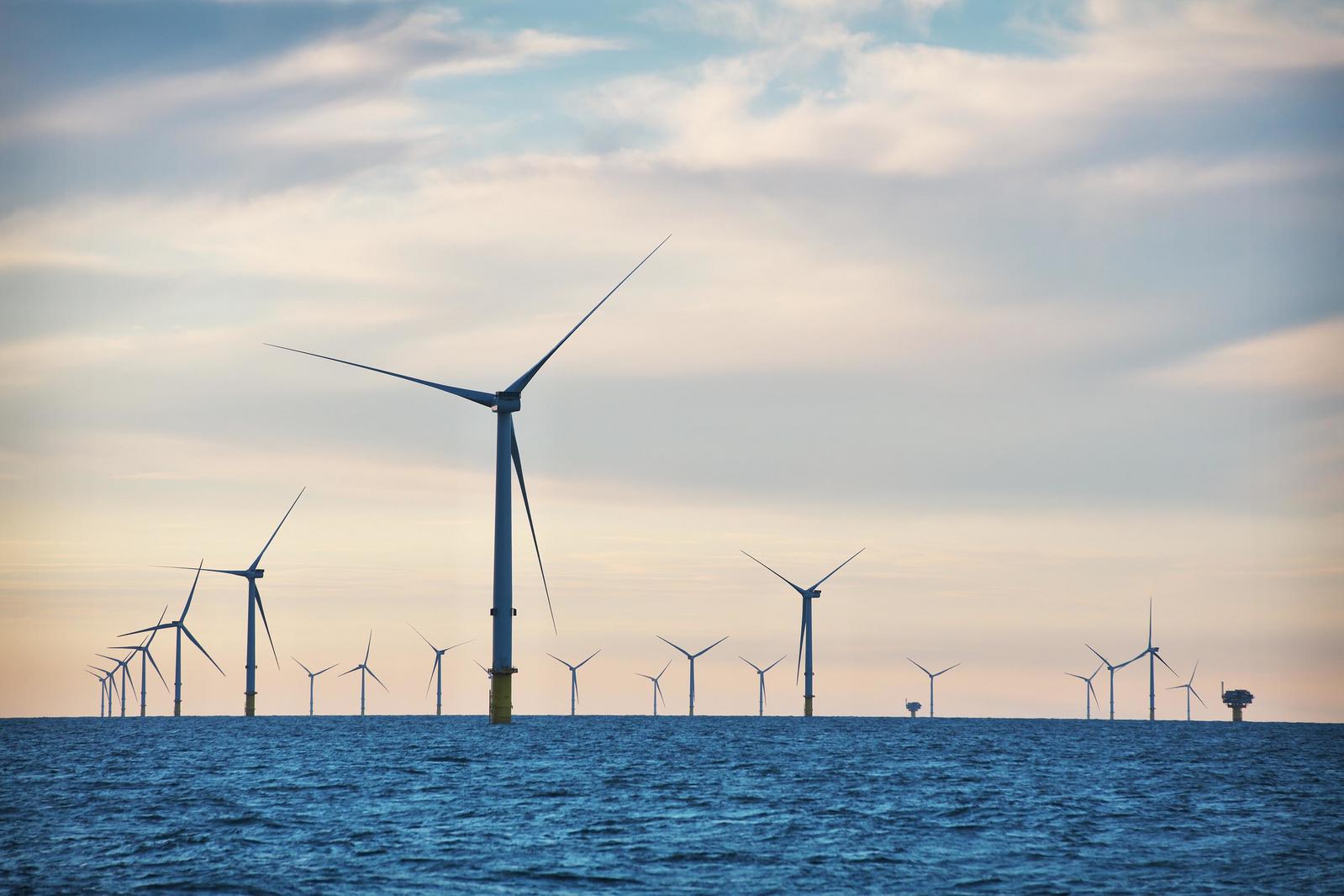
 www.offshorewind.biz
www.offshorewind.biz
The global pipeline of offshore wind projects which are operational, under construction, consented, or being planned has almost doubled over the past twelve months, from 429 GW in 2021 to 846 GW today, new research published by RenewableUK shows.
Europe has a pipeline of 350 GW (with 26 GW fully operational) and the pipeline in countries outside Europe stands at 496 GW, RenewableUK's latest EnergyPulse market intelligence data report shows.
According to the report, China has the biggest offshore wind project pipeline at 98 GW, the UK is in second place at 91 GW (up from 55 GW a year ago), the US is third with 80 GW and Germany is fourth with 57 GW.
(...)
More:

Global Offshore Wind Pipeline Doubles in a Year
The global pipeline of offshore wind projects which are operational, under construction, consented, or being planned has almost doubled over the past twelve months, from 429 GW in 2021 to 846 GW today, new research published by RenewableUK shows.
Global Offshore Wind Pipeline Doubles in a Year
The global pipeline of offshore wind projects which are operational, under construction, consented, or being planned has almost doubled over the past twelve months, from 429 GW in 2021 to 846 GW today, new research published by RenewableUK shows.
Europe has a pipeline of 350 GW (with 26 GW fully operational) and the pipeline in countries outside Europe stands at 496 GW, RenewableUK's latest EnergyPulse market intelligence data report shows.
According to the report, China has the biggest offshore wind project pipeline at 98 GW, the UK is in second place at 91 GW (up from 55 GW a year ago), the US is third with 80 GW and Germany is fourth with 57 GW.
(...)
More:

Global Offshore Wind Pipeline Doubles in a Year
The global pipeline of offshore wind projects which are operational, under construction, consented, or being planned has almost doubled over the past twelve months, from 429 GW in 2021 to 846 GW today, new research published by RenewableUK shows.www.offshorewind.biz
Niccccceee
Also found this PC Gamer article
Cloud gaming will save you money but won't save the planet
At this point, we need to push tech companies even harder to use alternate energy sources in their data centers.

36 Countries Are Gaining More Trees than They’re Losing
Satellite data shows that that 130.9 million hectares of land — an area larger than Peru — gained tree cover globally between 2000 and 2020, but loss still greatly exceeds growth.
All told, 130.9 million hectares of land gained tree cover globally between 2000 and 2020, according to the study. Put together, that's an area larger than Peru.
It's not all good news: Even though the world gained a significant area of tree cover over the past two decades, it still lost much more, with an overall net loss of more than 100 million hectares. And new trees don't make up for the loss of old-growth, carbon-rich forests. But this new data provides a chance to examine where and why gain is happening, opening up new opportunities to monitor and inform forest restoration efforts around the world.
Even though tree gain is occurring in many places, it doesn't negate the impacts of loss — especially in primary forests. Old trees store carbon differently than new ones. Animals and plants that make forests their homes need established, connected, old-growth forests in which to thrive.

Ecosia has a new browser extension and partners!
freetree, our new free browser extension, lets you plant trees while you're on the website, not just when you're searching for it. It allows you to plant trees while you shop at your favorite stores — without costing you a penny.

Amazon: e-cargo bikes to replace thousands of van deliveries in London
Online retailer opening ‘micromobility’ hub in Hackney as part of efforts to cut carbon emissions
Super cool. We need them here yesterday.
On another note, Gotta push more tech companies into adding solar to their power-hungry facilities, especially for huge server farms.
On another note, Gotta push more tech companies into adding solar to their power-hungry facilities, especially for huge server farms.
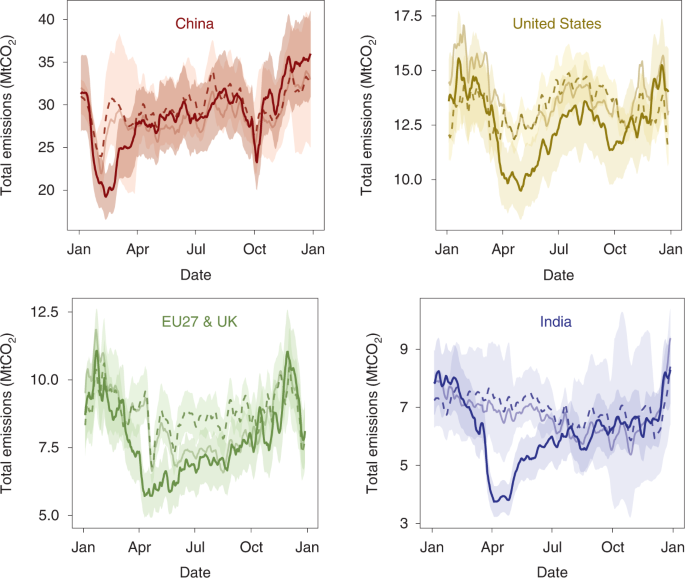
Daily monitoring reveals global CO2 emission patterns - Nature Geoscience
Monitoring of the daily global CO2 emissions in 2020 reveals the spatial–temporal pattern of the drop in emissions due to the impact of the COVID-19 pandemic. The daily CO2 emission changes also reveal different patterns of human activities and fossil CO2 emissions across countries, sectors and...

Decrease in CO2 emissions during pandemic shutdown shows it is possible to reach Paris Agreement goals
An international team of researchers has found that the sudden drop in CO2 emissions during the early days of the COVID-19 pandemic demonstrates that it is possible to reduce emissions enough to meet the 1.5 degrees Celsius global temperature increase goal. In their paper published in the...
An international team of researchers has found that the sudden drop in CO2 emissions during the early days of the COVID-19 pandemic demonstrates that it is possible to reduce emissions enough to meet the 1.5 degrees Celsius global temperature increase goal. In their paper published in the journal Nature Geoscience, the researchers describe studying aspects of the sudden drop of CO2 emissions in early 2020 and why the[y] believe their data shows that such reductions are possible in today's economy. The editors at Nature Geoscience have also published a short summary of the findings of the group on this new effort in the same journal edition.
During the early days of the pandemic, nobody knew how deadly the coronavirus was, or how fast it might spread. So governments around the world ordered an immediate lockdown—people stayed home instead of going to work. As result, the word's economy came to a near standstill. At the time, due to massive reductions in truck and automobile traffic and factory shutdowns, air pollution was greatly reduced. In this new effort, the researchers have taken a closer look at the reductions in CO2 that occurred during the first year of the pandemic.
The researchers suggest that the 2020 reductions show that the Paris Agreement goals are possible, and note that it might be possible to make similar reductions without a massive disruption to the global economy. Most of the reduction in 2020, a third of it, they note, was due to a significant reduction in car and truck traffic. If countries around the world applied more pressure on automakers and consumers, electric vehicles powered by renewably resourced electricity could become the norm, putting goals such as 1.5 degrees Celsius back in reach.
Hopefully the world figures out a way to decouple emissions from the economy sooner rather than later, since it's obvious that economic growth will continue to have priority.
View: https://twitter.com/TSearchinger/status/1544757472707084288?s=20&t=_S4ERSLQ9XXOGJM_01OgWg
Can someone explain this to me like i'm a 5 year old?
View: https://twitter.com/TSearchinger/status/1544757472707084288?s=20&t=_S4ERSLQ9XXOGJM_01OgWg
Can someone explain this to me like i'm a 5 year old?
There are agricultural techniques that prevent carbon from going out of the soil and into the air, but there are also additives (like biochar) you can add to the soil that capture more carbon. Probably not a silver bullet, but could still help.
- Status
- Not open for further replies.

